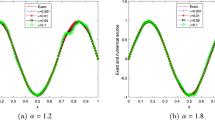Abstract
We consider a large class of impulsive retarded functional differential equations (IRFDEs) and prove a result concerning uniqueness of solutions of impulsive FDEs. Also, we present a new result on continuous dependence of solutions on parameters for this class of equations. More precisely, we consider a sequence of initial value problems for impulsive RFDEs in the above setting, with convergent right-hand sides, convergent impulse operators and uniformly convergent initial data. We assume that the limiting equation is an impulsive RFDE whose initial condition is the uniform limit of the sequence of the initial data and whose solution exists and is unique. Then, for sufficient large indexes, the elements of the sequence of impulsive retarded initial value problem admit a unique solution and such a sequence of solutions converges to the solution of the limiting Cauchy problem.
Similar content being viewed by others
References
M. Federson, J. G. Mesquita: Averaging principle for functional differential equations with impulses at variable times via Kurzweil equations. Differ. Integral Equ. 26 (2013), 1287–1320.
M. Federson, J. G. Mesquita: Averaging for retarded functional differential equations. J. Math. Anal. Appl. 382 (2011), 77–85.
M. Federson, Š. Schwabik: Generalized ODE approach to impulsive retarded functional differential equations. Differ. Integral Equ. 19 (2006), 1201–1234.
D. Fraňkova: Regulated functions. Math. Bohem. 116 (1991), 20–59.
J. K. Hale, S. M. Verduyn Lunel: Introduction to Functional Differential Equations. Applied Mathematical Sciences 99, Springer, New York, 1993.
C. S. Honig: Volterra Stieltjes-Integral Equations. Functional Analytic Methods; Linear Constraints. North-Holland Mathematical Studies 16, North-Holland Publishing, Amsterdam-Oxford; American Elsevier Publishing, New York, 1975.
J. Kurzweil: Generalized ordinary differential equations and continuous dependence on a parameter. Czech. Math. J. 7 (82) (1957), 418–449.
V. Lakshmikantham, D. D. Baĭnov, P. S. Simeonov: Theory of Impulsive Differential Equations. Series in Modern Applied Mathematics Vol. 6, World Scientific, Singapore, 1989.
X. Liu, G. Ballinger: Continuous dependence on initial values for impulsive delay differential equations. Appl. Math. Lett. 17 (2004), 483–490.
Š. Schwabik: Generalized Ordinary Differential Equations. Series in Real Analysis 5, World Scientific, Singapore, 1992
Author information
Authors and Affiliations
Corresponding author
Additional information
The first author was supported by FAPESP grant 2008/02879-1 and by CNPq grant 304646/2008-3. The second author was supported by FAPESP grant 2007/02731-1.
Rights and permissions
About this article
Cite this article
Federson, M., Mesquita, J.G. A new continuous dependence result for impulsive retarded functional differential equations. Czech Math J 66, 1–12 (2016). https://doi.org/10.1007/s10587-016-0233-6
Received:
Published:
Issue Date:
DOI: https://doi.org/10.1007/s10587-016-0233-6
Keywords
- retarded functional differential equation
- impulse local existence
- impulse local existence uniqueness
- continuous dependence on parameters



